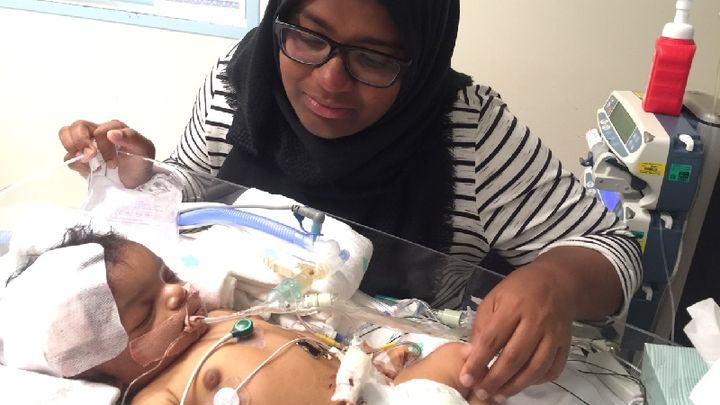
Stand By Kayban
Donation protected
This local family are locked in a desperate legal fight to stop their two-year-old son being deported from Australia because of his disability, amid fears being forced to move could lead to an early and painful death. Kayban Jamshaad has severe haemophilia — a bleeding disorder which stops blood clotting — and an acquired brain injury, which occurred when he was born at St John of God Bunbury Hospital in Western Australia. He requires weekly medication for his haemophilia and round-the-clock care to manage spastic quadriplegia, visual impairment, seizure disorder and developmental delays arising from his brain injury. Medical specialists said the Maldives was not equipped to manage Kayban's complex health needs, and forcing him to live there would most likely be fatal. "It's actually [the difference] between him staying alive and dying, as hard as it is to put into words," said his mother, Shizleen Aishath. Doctors sound grave warnings In a letter provided to the Department of Home Affairs, his rehabilitation physician warned that without proper care, Kayban would likely suffer a severe shortening of his muscles and joints, curvature of the spine, "osteoporosis, with a high risk of pathological fractures, hip dislocation, malnutrition, respiratory failures and premature death". WA Health's Haemophilia Service also advised the department that the Maldives does not have the resources or systems in place to provide adequate treatment. Despite those warnings, the department ruled there was not enough documentary evidence, or "compelling" and "compassionate" circumstances, to grant Kayban a health waiver that would allow him to stay. "The refusal to allow a child to stay even though he faces the certainty of a painful and premature death — if that's not sufficiently compassionate and compelling then I don't know what is," said migration agent Jan Gothard, who is a health and disability specialist with Estrin Saul Lawyers, which is handling the case. Kayban's mother is currently working as a social worker in Bunbury and holds a temporary skilled shortage visa. Her husband, daughter and other son were all granted support visas. 'It comes down to an algorithm' Under Australia's immigration laws, applicants can be rejected if they have any condition which could result in significant healthcare costs or prejudice the access of Australian citizens and residents to health services. The department estimated Kayban's health costs would be $59,000 a year. It said it was not satisfied his family could cover that cost, despite them doing so for almost three years without any access to any public health support, including Medicare. Dr Gothard said the visa that Kayban applied for would disqualify him from receiving any public health benefits, so the estimated costs were irrelevant. "These costs simply cannot accrue, and yet [applicants] are costed and they fail the health requirement as if they were going to be able to access these services," she said. "It's not logical, it's not rational, it's just silly." Kayban's case has been taken to the Administrative Appeals Tribunal — a legal process that could take months. While the family awaits that outcome, disability advocates say it is yet another example of Australia's discriminatory immigration laws. "Frankly it's obscene that we treat people with a disability this way," said Dwayne Cranfield, the chief executive of the National Ethnic Disability Alliance. "People are broken down to a cost-benefit essentially, it comes down to an algorithm — the humanity is taken out of the situation, you become an equation." Law exemption allows disability discrimination Dr Gothard says dozens of families are affected every year, and the impact is even more widespread. "I think it sends a very strong message to people with disability living in Australia … that basically people with disabilities are considered a burden on the Australian society, she said. "They're not deemed to contribute in any way at all and, given the choice, the Australian Government would much rather they weren't here." The department said it would not comment on individual cases, but insisted its policy was not discriminatory. "All applicants are treated in an equal and fair manner," a spokesperson said. But Dr Gothard said that was "bureaucratic doublespeak", and pointed to the Migration Act's exemption from the Disability Discrimination Act, to allow discrimination on the grounds of disability in migration decisions. Ms Aishath's employer told the department she would be "exceedingly difficult to replace" if her family was forced back to the Maldives, and "it would be a great loss to our company and to the region." (ABC NEWS) Kayban is a fighter and continues to defy the medical teams every day but this all comes at a huge cost with the rehabilitation and accessing the medical support he needs as well as legal and immigration costs. I appeal to you for your support and any donation of any ammount would help to relieve the immense financial pressure on Kayban and his family.
Organizer
Megan Jane
Organizer
Millbridge WA


